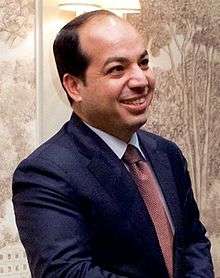Ahmed Maiteeq
| Ahmed Omar Maiteeq | |
|---|---|
 | |
| Vice Chairman of the Presidential Council of Libya | |
|
Assumed office 30 March 2016 | |
| President | Fayez al-Sarraj |
| Preceded by |
Imhemed Shaib & Ahmed Huma (Deputy Presidents of the House of Representatives) |
| Deputy Prime Minister of Libya | |
|
Assumed office 5 April 2016[1] | |
| Prime Minister | Fayez al-Sarraj |
| Prime Minister of Libya Acting | |
|
In office 25 May 2014 – 9 June 2014 | |
| President | Nouri Abusahmain |
| Preceded by | Abdullah al-Thani |
| Succeeded by | Abdullah al-Thani |
| Personal details | |
| Born |
1972 Tripoli, Libya |
| *Maiteeq's term was disputed by Abdullah al-Thani. | |
Ahmed Omar Maiteeq is a Libyan businessman and politician, originally from Misrata, who was elected Prime Minister of Libya in May 2014.[2] His election as prime minister took place under disputed circumstances. The Justice Ministry decided on 29 May that Maiteeq was not the Prime Minister due to voting procedural issue occurred when the First Deputy of GNC left the session without valid reason. The Libyan Supreme Court was expected to issue a verdict on 5 June 2014 regarding the election of Maiteeq,[3] although it indicated on that day that it believed that the appointment of Maiteeq was invalid, the court stated that appeals should be heard and delayed a final ruling until 9 June.[4] The court ruled on 9 June that Maiteeq appointment was invalid; Abdullah al-Thani is expected to stay on as prime minister.[5] Maiteeq submitted his resignation voluntarily in same day.[6]
Early life and education
Maiteeq was born on 1972 in Tripoli, Libya. His father held a number of high offices during the monarchical period prior to the Gaddafi regime. Maiteeq is a cousin to the controversial GNC representative from Misrata, Abdulrahman Asswehly. He was also the grandson of the Libyan freedom fighter, Ramadan Asswehly. He obtained degrees in economy and business management from a university in London. [7]
2011 civil war
During the revolution, he took part in the fighting in Misrata and the liberation of Tripoli. He was a member of the Chamber for the Liberation of Tripoli during the conflict and a member of the Tripoli Development and Stability Council after the fall of the regime.
Prime Minister and Deputy Prime Minister
Following Acting Prime Minister Abdullah al-Thani's call that he would resign on 13 April for an alleged attack on his family, he was persuaded to stay on till a new leader was elected.[8] The first day of voting on 28 April was disrupted by armed men firing in parliament.[9] In a voting session at the General National Congress that was described by Al Jazeera English as "chaotic," Maiteeq was elected, and took the oath, "I swear I will carry out my duties honestly and in devotion." Later MP Fatma al-Majbari told Libyan television station Al-Ahrar: "There are violations in today's session" and that a certain alteration of the votes had occurred after the session was adjourned."[10] Ultimately in the days that followed, the Libyan Supreme Court ruled that the election of Maiteeq had been invalid, and the previous Prime Minister, al-Thani, agreed to return to office.
al-Thani, had earlier signed an agreement with those holding the smaller oil export terminals of Hariga and Zueitina, those holding the larger Ras Lanuf and Es Sider terminals refused to recognise Maiteeq. Spokesman Ali Hasi said: "Maiteeq came to power illegally."[11]
Maiteeq identifies as an independent and as not affiliated to any political party or movement.[12]
In March 2016, he became Deputy Prime minister[13] and Vice-Chairman of the Presidential Council.[14]
Family
He is married and has four children.
See also
References
- ↑ http://rulers.org/rull.html#libya
- ↑ "Libyan parliament elects new PM". Al Jazeera English. 4 May 2014. Archived from the original on 21 May 2014. Retrieved 4 June 2014.
- ↑ "Breaking news: Thinni travels to Benghazi". Libya Herald. 4 June 2014. Retrieved 4 June 2014.
- ↑ "Supreme Court sees Maetig appointment at illegal but postpones final decision until 9 June". Libya Herald. 6 June 2014. Retrieved 6 June 2014.
- ↑ "Libya PM's election declared unconstitutional". Al Jazeera English. 9 June 2014. Retrieved 9 June 2014.
- ↑ "Maetig accepts Supreme Court ruling and resigns". Libya Herald. 9 June 2014. Retrieved 9 June 2014.
- ↑ "Libya's new prime minister". 8 May 2014.
- ↑ Frizell, Sam (13 April 2014). "Libya PM Quits, Says He Was Targeted in Armed Attack". Time. Retrieved 27 May 2014.
- ↑ "Libya appoints Ahmed Maitig as new prime minister". BBC. 4 May 2014. Retrieved 27 May 2014.
- ↑ "Confusion surrounds Libya PM's election". Al Jazeera English. 5 May 2014. Archived from the original on 21 May 2014. Retrieved 27 May 2014.
- ↑ "Libyan rebels refuse to deal with new PM". Aljazeera. 7 May 2014. Archived from the original on 21 May 2014. Retrieved 27 May 2014.
- ↑ "رئيس الوزراء الليبي المكلف: لا أنتمي لأي تيار سياسي لا إسلامي ولا غيره (Libyan Prime Minister-designate: I do not belong to any political movement not an Islamic or any other)". Al Masry Al Youm (in Arabic). 6 May 2014. Archived from the original on 12 May 2014. Retrieved 27 May 2014.
- ↑ http://www.maltatoday.com.mt/news/world/60393/new_divisions_come_forth_as_rival_parliaments_unite_against_imposed_libya_government
- ↑ http://allafrica.com/stories/201603081452.html
| Political offices | ||
|---|---|---|
| Preceded by Abdullah al-Thani |
Prime Minister of Libya 2014 |
Succeeded by Abdullah al-Thani |